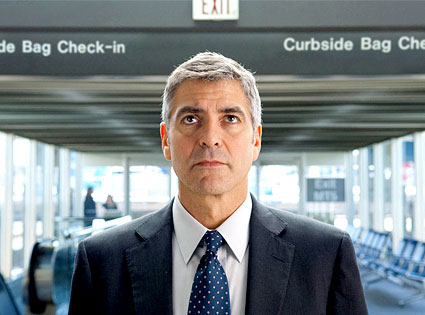Sunday, January 24, 2010
About Elly (2009, Farhadi)
Monday, January 18, 2010
Up in the Air (2009, J. Reitman)
Saturday, January 9, 2010
Avatar (2009, Cameron)
Friday, January 1, 2010
The Sound of Insects: Record of a Mummy (2008, Liechti)

Rating: ***1/2
A thematic cousin to Steve McQueen’s Hunger (2008), the experimental semi-documentary essay The Sound of Insects: Record of a Mummy (2008) is Peter Liechti’s journey away from the filmic depiction of a body’s end. While the off-screen narration (based on a novel by Masahiko Shimada) details a self-inflicted death by starvation of a cryptic recluse, we never get to see the narrator – save for a brief long shot of a cloth-covered stretcher at the beginning of the film. What we see are almost entirely unpopulated shots of the woods, the inside of the shack the narrator built for himself, and other seemingly unassociated footage of nature and cities. Rarely does a human figure enter the frame, and if they do they remain unidentified (vaguely remembered?) by the narrator.
Liechti drains his images from narrative cohesion and significance almost entirely, save for the recurring image of the plastic-foil coverage of the shack’s makeshift rooftop, which gets more and more specked with insects, foliage and mud as the narration proceeds. These shots, specific yet verging on the abstract, are the most striking images in the film – in fact, the only images that indicate any kind of shared perspective between the unseen central character and the ultra-detached, free-flowing camera.
As the narrator’s body withers down (or so we believe), what keeps undermining our sympathy are the small inconsistencies within the eponymous record (a mirror is never mentioned and yet facial changes are described in detail), and the unexplained motive behind the extremely painful form of death chosen by the man. We never get any specifics about his life or profession, and thus in the end his motives seem purely philosophical, if not religious (on the day 40 of his fast, he likens himself to Buddha and Jesus and expects to share their experience of a divine visitation).
Ultimately, the film feels less an ordeal than a meditation, and Liechti’s understated editing strategies, as well as his apt use of distorted sound, play into the idea of not really meeting a character, but sharing a state of mind. It’s one of doubt, curiosity and fear of total spiritual self-obliteration that may or may not follow the willed demise of a body.
Crimen Ferpecto (2004, Iglesia)

Rating: ***
The 2004 black comedy, Crimen Ferpecto - merely my second exposure to the formidable talents of Álex de la Iglesia – struck me as a slightly lesser work than The Day of the Beast (1995). With a story not nearly as outrageous as the one used there (no cosmic importance to any of the characters’ actions in Crimen Ferpecto), the level of cartoon violence and wild slapstick simply had to go many-a-notch down – and I missed it.
While Iglesia invests a lot of skill into the presentation of his central character, Rafael (Gillermo Toledo), the long narrative build-up seems perfunctory and hollow, especially once measured against the sheer banality and faux-uplift of the final resolution (capitalism gets caned for perpetuating iconic stereotypes of beauty).
Rafael is a sex-emperor, ruling his small but glossy domain as a manager of a female-populated garment section at a Madrid department store. It is in presenting his ways with women-employees where the movie fails most: and in Iglesia, by “failure” I mean his going mild. His great ease with controlled cartoon cruelty (both physical and verbal) is subdued in those parts, even though the comic-routine prologue makes you hungry for it. It’s not until the last act, when frustrated Rafael connives an epic scheme to get rid of his presented-as-ugly wife, Lourdes (Mónica Cervera), that the film’s pulse starts pounding away.
Iglesia, while sharing many aesthetic affinities with Almdóvar (they both love glossy surfaces, highly saturated colors and outrageous, all-out dialogue), is very much his own guy. Leaning toward the spectacular, the macabre and the lurid, he nevertheless is a perfect coming-timing machine – and it’s the comedy that dominates all the other layers of his films.
I only wish Crimen Ferpecto felt less muzzled; what’s to blame is the structure, though, and not the filmmaker’s inability to bite.
2010

Welcome in 2010! Hope y’all are ready for another awesome movie-going year.
Here’s one major change I want to apply to „Last Seat on the Right” this year: a star-system (not unlike the one used by Roger Ebert) will be used to evaluate each reviewed film. The system goes as follows:
**** [MASTERPIECE]
***1/2 [VERY GOOD]
*** [GOOD]
**1/2 [AVERAGE]
** [WEAK]
*1/2 [BAD]
* [TERRIBLE]
I hope you’ll keep visiting. Meanwhile, let’s listen to a Harry Connick Jr. version of “Hey There” from Richard Adler and Jerry Ross’ 1954 show, The Pajama Game. There’s only one reference to stars (at 0:26-0:29: „You with the stars in your eyes…”), but what the heck.






